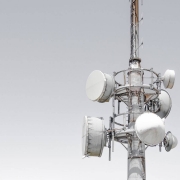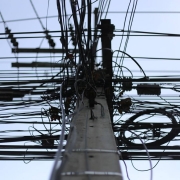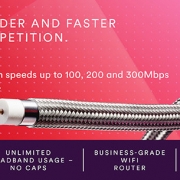UK households are switching to faster broadband services. As a result, they are receiving faster and more reliable internet services. Telecoms industry regulator Ofcom has released research demonstrating the average broadband speeds have increased by 20% since the beginning of 2017.
Nearly 5,000 residential broadband users volunteered to have monitors installed on their home routers for the research. Reassuringly, the main conclusion was that the average download speed in the UK is over 50Mbps. This is the first-time figures of this size have been seen in the UK. This is also up by 18% within 12 months.
What are Mbps?
Mbps are megabits per second and is used to specify internet connection speeds, unlike MBps which is used to specify how much of a file is downloaded or uploaded per second.
The Results of the Research
The fastest recorded speeds were found on Virgin Media’s Vivid 350 package. This is a hybrid cable-fibre service. The peak download speed was 360.2Mbps
This could be compared with BT where the average peak speed was 300.6Mbps.
However, the fastest average peak uploads were on BTs full-fibre service at 48.8Mbps
Fibre v Copper
Serviceteam IT has written numerous blogs about the switch to leased line providers, the moving in of fibre-to-the-premise and the expulsion of copper-based packages. There is a greater demand for the full-fibre broadband in the UK and the figures boasting its successes is likely to help the movement.
However, here is a quick overview:
- Fibre broadband = type of broadband technology that offers a quicker speed and more reliable internet. It has plastic or glass cables which allow for faster data transfer than copper wires.
- Copper broadband = the longer the length of copper, the weaker the signal strength and the slower the broadband.
It may not be surprising that the fibre-to-the-premise or full-fibre packages were more effective that the copper-based lines. However, the greatest difference between the packages was during the peak times that the broadband services were used.
What has brought this change?
Broadband still comes in many shapes and sizes: “Broadband comes in lots of flavours these days: copper, superfast, cable and full fibre. Which kind you choose can really affect your online experience,” said Yih-Choung Teh, director of Ofcom’s Strategy and Research Group.
However, Phillip Hammond has confirmed the switch off date would be set by government intervention if the industry was not fast enough. We already know that the National Infrastructure Commission report said that copper wires should be switched off with a full fibre network by 2033.
“While the UK’s broadband infrastructure clearly continues to improve, the sector can still do better in communicating this. Although 95% of homes and offices can access superfast services, there remain many who are unaware they can do so,” said Richard Nuedegg, head of regulation at uSwitch.com.
Are you paying more than you should for your broadband? There will be differences depending on your location in the country. There will be a change and a digital divide between these services, so it is better, especially for your business, to ensure you are not the one behind!
Inquire whether you are eligible for a faster broadband today!











Leave a Reply
Want to join the discussion?Feel free to contribute!